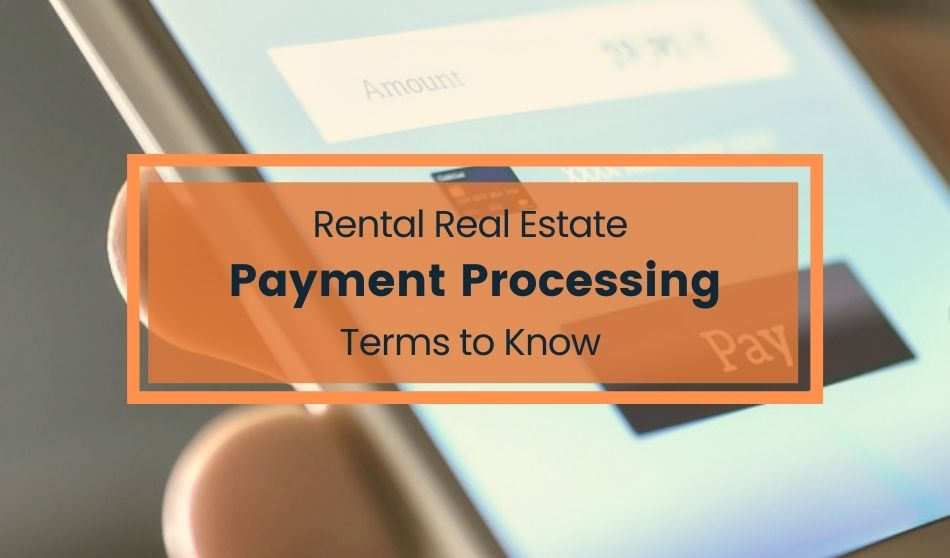
Real estate terminology encompasses the language of the rental industry. However, those real estate buzz words don’t always cover other industries related to landlording such as payment processing.
Rent payment processing can be less complex with this handy glossary of real estate terms related to payment methods, important financial identification numbers, as well as payment processing terms and timelines.
Payment Methods
The ability of a tenant to pay their rent by as many options as possible may make chasing rent payments a thing of the past. Not all of the below options are optimal for processing rent payments or sending owner disbursements.
ACH – Automated Clearing House: As the name suggests, these automated payments are scheduled and authorized by the person or organization requesting the withdrawal from a financial institution and processed in a batch. An ACH batch processes the exchange of electronic fund transactions between financial institutions.
Due to the nature of batched and processed transactions, ACH transactions are not real-time settlement payments but rather rely on the timing of funding, and are at the mercy of each financial institution’s processing time.
Bank Draft: Also known as a cashier’s check or bank check, a bank draft is a check guaranteed by a financial institution as the purchasers’ funds have been forwarded to the bank to cover the amount of the draft. When cashed, it will be the financial institutions’ internal account that covers the amount.
Cash Payment: Payments of physical paper and coin currency. New service providers exist to accept cash payments on behalf of a merchant and convert them into electronic payments eliminating the risk of errors, embezzlement, or safety in dealing with cash on-premises (see Cash Payment Network below).
Cashier’s Check: see Bank Draft
Credit Card: Payment with credit extended by a financial institution. Unlike a debit card which withdrawals actual funds available, a credit card payment is a promise to the financial institution of repayment with conditions that may include interest, credit reporting, and due dates.
Direct Deposit: After a signed authorization by the receiver, funds are sent from an entity using the ACH payment network to an individual’s bank account such as for payroll and tax refunds.
eChecks: An eCheck is an electronic or virtual version of a paper check processed through an ACH network.
EFT – Electronic Funds Transfer: A broad term to describe an electronic payment from one account to another. These are also called electronic checks or eChecks. The payer initiates and authorizes payment, funds are removed and are then credited to the receiving bank, then the bank credits (pays) the beneficiary. Balances change for both parties through electronic communication only.
Money Order: Similar to a check, a money order used for making payments. They are only issued, however, after a buyer pays for the money order with guaranteed funds.
Paper Checks: A paper check is a written instruction ordering and authorizing the transfer of funds from one bank to another.
Wire Transfers: Similar to an ACH, yet in single transactions and not in batches. Used typically for international fund transfers as ACH is US-only. Faster than ACH but financial institutions charge higher fees for expedited processing.
Understanding Financial Identification Numbers
Financial institutions rely on identification numbers to communicate important information. Not specifically real estate acronyms as such, but important to know when dealing with payment processing for your rentals.
ABA Routing Number: American Bankers Association number is a nine-digit number used to identify financial institutions for the purpose of transferring funds; typically paper or check, from one bank to another. This number is located at the bottom of a check and check register.
ACH Routing Number: The nine-digit number used by financial institutions for electronic ACH transfers. Not all financial institutions have a separate ACH routing number aside from the ABA routing number. Other financial institutions may have many different routing numbers depending on the type of transaction.
Authorization Code (Auth Code): This is also known as an approval code. It can be numeric or alphanumeric and confirms a transaction is approved.
Bank Identification Number (BIN): Also known as the Issuer Identification Number (IIN), this number is the first four to six digits of a credit card number. The first digit signifies the credit card network:
3 – American Express
4 – Visa
5 – MasterCard
6 – Discover Card
Bank Routing Number: This nine-digit number is used to identify a financial institution and has three segments. The first four digits indicate which financial institution, the second four refer to which Federal Reserve bank it uses to process transfers, and the ninth digit validates the first eight digits to detect errors that may have been introduced during transmission. Bank routing numbers can change if a financial institution changes hands or merges with another. (See also ABA, ACH, and RTN)
CVV – Card Verification Value: Similar to a PIN (Personal Identification Number) on a debit card in that the CVV is used to help prevent fraud and verify the cardholder is the authorized user. In contrast to a PIN, the CVV is issued by the credit card company and can not be changed.
Visa, MasterCard, and Discover have a three-digit code on the back of the card whereas American Express CVV is four digits long and located on the front right. American Express and Discover often refer to the CVV as a CID (Card Identification Number) and the terms are synonymous.
A CVV2 number is the next generation of CVV numbers created by credit card companies to assist in reducing internet transaction fraud.
RTN: The acronym for a generic routing number. Routing numbers are not unique to the account holder but rather to the financial institution and transaction type. The account number then guides the transaction to or from the specific account holder.
Transaction ID: A special set of numbers that defines a transaction. This number is always unique to the transaction and is not duplicated by a processor. The number helps the financial institution, merchant, and/or consumer identify a transaction that occurred between parties.
Payment Processing Terms
From a tenant paying rent by cash at a kiosk to processing an ACH owner disbursement to accepting credit card rent payments, a myriad of terms exists for payment processing.
AVS – Address Verification Service: A fraud prevention service for credit card processing. Identifying information is sent with a credit card request which verifies the address used in processing the payment matches the address on file with the financial institution. When there is a mismatch of information, the transaction is denied. This limits processing errors, charge-backs, and fraud.
Batch Processing: Transactions are bundled into a group(s) to be transmitted simultaneously at set intervals in batches. Merchant service providers use batch processing. The timing of the batch process is determined by the merchant service provider.
Business Type Checking Account: To establish a merchant services account to process electronic payments, it is required to first establish a business type checking account. Many financial institutions offer business checking accounts to sole proprietors such as private landlords. Creating a corporation or company entity is typically not a requirement to establish a business checking account as a private landlord can conduct the rental business in the property owner’s name (see DBA).
Cash Payment Network: A cash payment network allows a consumer to walk to a convenient local business to make a payment that would have otherwise needed to be mailed or delivered in person. An example of a cash payment network is PayNearMe.
Chargeback: A credit card or electronic payment dispute initiated by the consumer.
Credit Card Processing: Merchant service providers offer credit card processing, however, it is a separate product than ACH transactions and requires additional agreements and guarantees (see PCI). Credit card processing for rent payments does not require equipment such as a physical terminal as the tenant portal acts as a virtual terminal (see Payment Gateway).
CSG Forte: A merchant services provider that processes payments between parties such as an ACH or credit card payment rent payment or an ACH owner disbursement. Many property management software companies have a relationship with Forte to provide the option for landlords and property management companies to enroll in merchant processing. CSG Forte also provides a required NACHA verification service that helps reduce incidences of fraud and theft.
DBA – Doing Business As: This term and acronym is a legal designation of a person using their name to collect payment for services; conducting business oneself as a sole-proprietor. A DBA may also be used by a parent company for a smaller division or brand. Check with local, state, and federal regulations for managing rental properties utilizing a DBA.
Electronic Payment: Any payment that is not manually processed such as cash or paper checks. This includes ACH, eChecks, EFT, credit card transactions, and the like.
Error Codes: If an electronic payment fails to process, depending on the type of error the financial institution, the software, or the processor system will send an error code. Some examples include:
— ACH Failed “Per Trans Limits” or “Exceeded Trans Limits”(see Transaction Limits)
— AVS Failure Zipcode: the AVS state/zip code check failed (see AVS)
Funding: The time it takes for funds to be deposited into the receiving bank account. Transaction timing revolves around many factors. In that, many merchant service providers offer funding faster than the actual transaction timing; essentially advanced funding. Typical funding is approximately 3-5 business days. In rare cases, funds may be available as soon as next-day depending on the provider, the sending and receiving banks, and the merchant service relationship.
Guarantor: When establishing a merchant services account, a personal guarantee is needed to secure the account for liability reasons. Inherent to payment processing allowing individuals access to transfer funds from bank to bank carries certain risks and the merchant account provider requires that the account provide a secure endorsement.
Merchant: In the rental industry, the merchant is the landlord or property management conducting business in the rental industry.
Merchant Bank (acquiring bank): The financial institution that will be receiving electronic payments, ie: the landlord’s business checking account.
Merchant Processing Agreement: This agreement is the contract between the merchant service provider and the merchant which details the terms, conditions, and responsibilities involved.
Merchant Service Provider (Merchant Account Provider): The third-party vendor responsible for the communication between financial institutions, and the movement of funds between those institutions, for a merchant, such as a landlord or property manager (See Forte).
National Automated Clearing House Association (NACHA): The NACHA governs the administration, regulations, and development for the ACH network.
PCI – Payment Card Industry: PCI was created in 2006 to provide consistency and safety in credit card processing and is regulated by the PCI Security Standards Council tasked with creating the standard credit card processing compliance. When a merchant has established a merchant services account and applies for credit card processing, they are required to establish and maintain PCI compliance.
Payment Gateway: The software interface between a merchant such as a landlord and the payment processor such as PayNearMe or Forte. This gateway is required to facilitate electronic transactions.
Payment Processing: The steps it takes from the initial payment request to the final funding. Processing electronic payments require sign-up, set-up, configuration, authorizations, and cooperation between multiple parties and institutions.
PayNearMe: A Cash Payment Network with over 27,000 participating retail locations that allow tenants to pay rent at a convenient location with cash, paper checks, cashier’s checks, etc.
Reversal: A transaction that has been sent through a payment gateway in error and is then canceled.
Settlement: The process of a batch lifecycle where the funds from authorized transactions processed and in the final stage are sent to the merchant’s bank for deposit.
Settlement Report: The settlement report that shows the individual transactions that were included in the batched settlement received.
Transaction Fees: A fee associated with processing an electronic payment transaction. Depending on the service provider and agreement terms, a fee might be assessed on the one paying and/or on the merchant (who may or may not decided to recover that expense with an end-user convenience fee).
Transaction Limits: Customarily, merchant processing services fund the merchant faster than the actual timing of a transaction. In that, the providers may set the following limits to cut down on potential fraud or to avoid processing an amount entered in error:
— Per Transaction Limit
— Daily Limit
— Monthly Limit
The merchant service provider regulates these limitations and each provider has criteria for having those limits increased.
Transaction Return Codes: The NACHA specifies codes when a transaction has been returned or rejected. Some common codes include:
R01: Insufficient Funds (balance not sufficient to cover transaction amount)
R02: Account Closed (previous open account now closed)
R03: No Account (account closed or does not match name submitted)
R04: Invalid Account Number (invalid account number structure)
*Check with your merchant service provider for additional transaction return code information.
Rental payment processing is becoming more advanced with many electronic options available for property managers and landlords. Tapping into those tools, a landlord will need to establish relationships with merchant processors and cash payment providers and keep current on payment processing real estate terminology.





